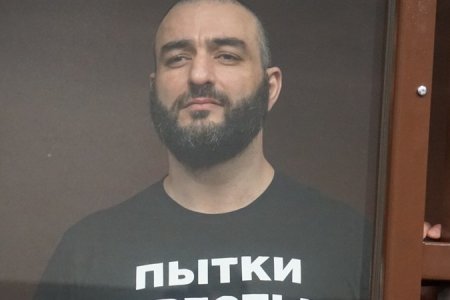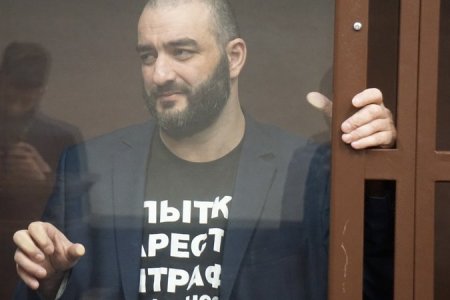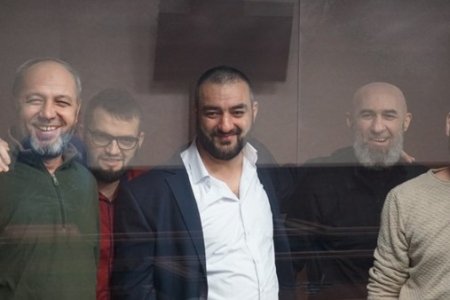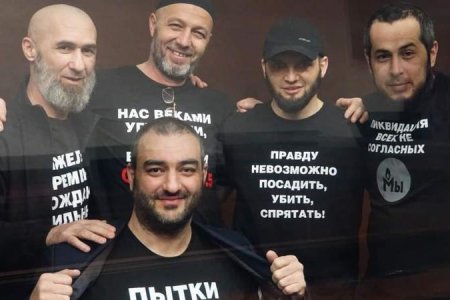
Ukrainian human rights organizations have issued an urgent warning that Tofik Abdulgaziev’s life is in danger and demanded that Russia release the Crimean Tatar political prisoner who is serving a 12-year sentence for his role in the important Crimean Solidarity human rights movement.
As reported, Abdulgaziev is suffering from tuberculosis and other serious conditions contracted in Russian imprisonment and ended up in a critical care unit in March this year. His health continues to be of major concern and publicity is urgently needed as employees of Russia’s penal service and ‘justice system’ are, typically, unwilling to take any adequate action where Moscow’s political prisoners are concerned.
Tofik Abdulgaziev is one of the 25 Crimean Tatar civic journalists and activists arrested on 27 March 2019 (or shortly afterwards) in Russia’s worst attack to date on the Crimean Tatar human rights movement in occupied Crimea. He has been in Russian captivity ever since and the tuberculosis and other serious conditions are all, doubtless, linked with the appalling conditions in Russian or Russian occupation penal institutions.
He was moved, in July 2023, to the Verkhneuralsk Prison in Chelyabinsk oblast, 2,700 kilometres from his home and family in Crimea. It was after the gruelling journey across Russia that Abdulgaziev began drastically losing weight and complaining of acute joint pain. In February 2024, his lawyer Emil Kurbedinov reported that he was unable to move about and that he problems even holding a spoon.
Typically, Tofik’s wife, Aliye Kurtametova, only learned that her husband was in intensive care on 7 March after she rang the prison because she had not heard from him for a long time. She was told only that he had been taken to hospital with a high temperature, but not to which hospital. It was only by ringing all hospitals in the region, she learned that he had been moved to the Russian penal service’s No. 3 Tuberculosis Clinic. Then on 22 March, she managed to get through again and was informed, this time, that he was in a critical state in the emergency ward. Kurbedinov later learned that he had been diagnosed with tuberculosis, double pneumonia; fluid in the lungs; medium severity anaemia ; connective tissue dysplasia with damage to the mitral valve (valvular heart disease); chronic heart failure; chronic gastritis and kidney stones.
Tofik Abdullayev (b. 19.06.1982) only recently turned 42 and was in perfectly good health before he was targeted by Russia’s FSB for his Crimean Solidarity activism. He and the other political prisoners were held in overcrowded and unsanitary conditions, first in Crimean and Russian SIZO [remand prisons], now in a prison, the worst of Russia’s penal institutions. The temperature in Chelyabinsk oblast is significantly lower than in Crimea, yet the men were forced, through the lack of any ventilation in their cell, to keep the window open all the time.
In their appeal, the Ukrainian NGOs point out that some of the conditions which Abdulgaziev has been diagnosed with are on Russia’s official list of illnesses that should preclude continued imprisonment. As soon as the diagnosis was received, therefore, the defence applied to a Russian court to order the penal service to release Abdulgaziev. Review of this application had been scheduled for 8 July, but was suddenly postponed for a month, until 6 August, purportedly “for technical reasons”.
The defence has also learned that the prosecution has organized its own supposed expert assessment which has claimed that Abdulgaziev does not have illnesses that prevent him remaining in prison. This is not the first time that Russian officials have resorted to such tactics, with some penal service medical personnel unfortunately prepared to forget their Hippocratic oath and effectively provide politically motivated ‘medical opinions’.
Russia is, unfortunately, most unlikely to heed the appeal to release Tofik Abdulgaziev and end its political persecution and illegal application of its legislation on occupied Ukrainian territory. The NGOs, however, also call on the Ukrainian authorities to add Abdulgaziev to the list of prisoners for exchange and to develop effective mechanisms for securing the release of Russia’s Ukrainian political prisoners and civilian hostages.
People in other countries can also help by addressing letters to the Russian human ombudsperson Tatyana Moskalkova, asking that Tofik Abdulgaziev be released due to his critical state of health. Letters can be written to Moskalkova[at]ombudsmanrf.ru
Please help also by publicising the plight of Tofik Abdulgaziev and the other Crimean Tatar civic journalists and activists imprisoned for having refused to either be driven out of their homeland or to remain silent about Russia’s repression in occupied Crimea.
Tofik and Aliye have three children – Amar (b. 2005); Medina (b. 2010) and Yarmina (2015) and were also bringing up Aliye’s daughter, Sayire from her first marriage. Since his father’s arrest, Amar has taken part in Crimean Solidarity, and has faced persecution himself, even while underage (See: Crimean Tatar political prisoner’s child told by Russian officer that they’ll come back for him – and they have.)
Although it was clear by 2019 that all human rights activists were in danger, Tofik Abdulgaziev could not stand by passively while others were facing persecution. He played an active role both in Crimean Solidarity, and in the linked Crimean Childhood organization, which particularly provides support to the children of political prisoners. Abdulgaziev actively visited political trials, organized parcels for political prisoners, was sound operator for recordings, and organized activities for children traumatized by the armed raids and arrests of their fathers.
He and his family were subjected to a first armed search on 4 May 2017. That was, presumably, the FSB’s warning of what would happen if he refused to leave the peninsula or end his civic activities. The next attack, on 27 March 2019, was much more serious. The arrests so obviously targeted men involved in highlighting repression and helping the victims of persecution that international condemnation was swift. Human Rights Watch called the arrests “an unprecedented move to intensify pressure on a group largely critical of Russia’s occupation of the Crimean Peninsula” and stated unequivocally that attempts “to portray politically active Crimean Tatars as terrorists” is aimed at silencing them. There was similar criticism from the US State Department ; the EU ; Freedom House and Civil Rights Defenders, and the Memorial Human Rights Centre almost immediately declared all the men political prisoners and denounce the attempt “to crush the Crimean Tatar human rights movement”.
The 25 Crimean Tatars were charged only with ‘involvement’ in the Hizb ut-Tahrir movement, a peaceful transnational Muslim organization which is legal in Ukraine and not known to have carried out acts of terrorism anywhere in the world. Russia has never provided any grounds for its highly secretive 2003 Supreme Court ruling that declared Hizb ut-Tahrir ‘terrorist’, yet this inexplicable ruling is now being used as justification for huge sentences on supposed ‘terrorism charges’. Five of the men faced the more serious charge of ‘organizing’ a Hizb ut-Tahrir group (Article 205.5 § 1 of Russia’s criminal code), while the others, including Abdulgaziev were accused of ‘taking part’ in such an unproven group. The aggressor state, which invaded and annexed Crimea also charged the 25 Ukrainian citizens with “planning a violent seizure of power and change in Russia’s constitutional order” (Article 278).
The prosecution claimed that the ‘proof’ to back these charges came from innocuous discussions about religion, politics, courage which were illicitly taped back in early 2016. Three years elapsed before the FSB carried out the arrests, making the ‘terrorism’ charges seem especially preposterous. Faulty transcripts of these conversations were sent to FSB-loyal ‘experts’ who are chosen for their willingness to ‘find’ whatever the FSB demands of them. The defence obtained independent expert assessments by people actually qualified in their field. Their analysis of the supposed expert assessments was damning, but ignored by the court.
As in all of these ‘trials’, the judges collaborated with prosecutor Yury Konstantinovich Nesterov in allowing anonymous or secret witnesses despite the lack of any evidence that these ‘witnesses’ would be in danger if they testified openly. There is considerable evidence that ‘anonymous witnesses’ are often people who have themselves been tortured and / or threatened with imprisonment if they do not collaborate with the FSB. It is invariably these alleged witnesses who claim to have heard the defendants admit to being members of Hizb ut-Tahrir , or similar. They almost always claim to remember particular ‘incriminating conversations’ while demonstrating total ‘amnesia’ about everything else. In the last report on occupied Crimea from UN Secretary General Antonio Guterres , there was particular criticism of Russian convictions based almost exclusively on anonymous testimony, and of the role played by Russian judges in upholding such practice and preventing the defence from exposing the flaws in this alleged ‘testimony’.
Russia split the 25 political prisoners into five groups, staging the same cloned ‘trial’ with each. Tofik Abdulgaziev was found ‘guilty’ on 12 May 2022, together with four other civic activists: Bilyal Adilov (b. 1970); Vladlen Abdulkadyrov (b. 1979): Izet Abdullayev (b. 1986),; and Medzhit Abdurakhmanov (b. 1975). Presiding judge Rizvan Zubairov, together with Maxim Nikitin and Roman Saprunov from the Southern District Military Court sentenced Adilov to 14 years; Abdulgaziev and the other men to 12 years. In all cases the first five years were to be in a prison, the worst of all Russia’s penal institutions.
These monstrous sentences against innocent men were upheld on 17 May 2023 by ‘judge’ Anatoly Solin and two colleagues from the Military court of appeal in Vlasikha (Moscow region).



